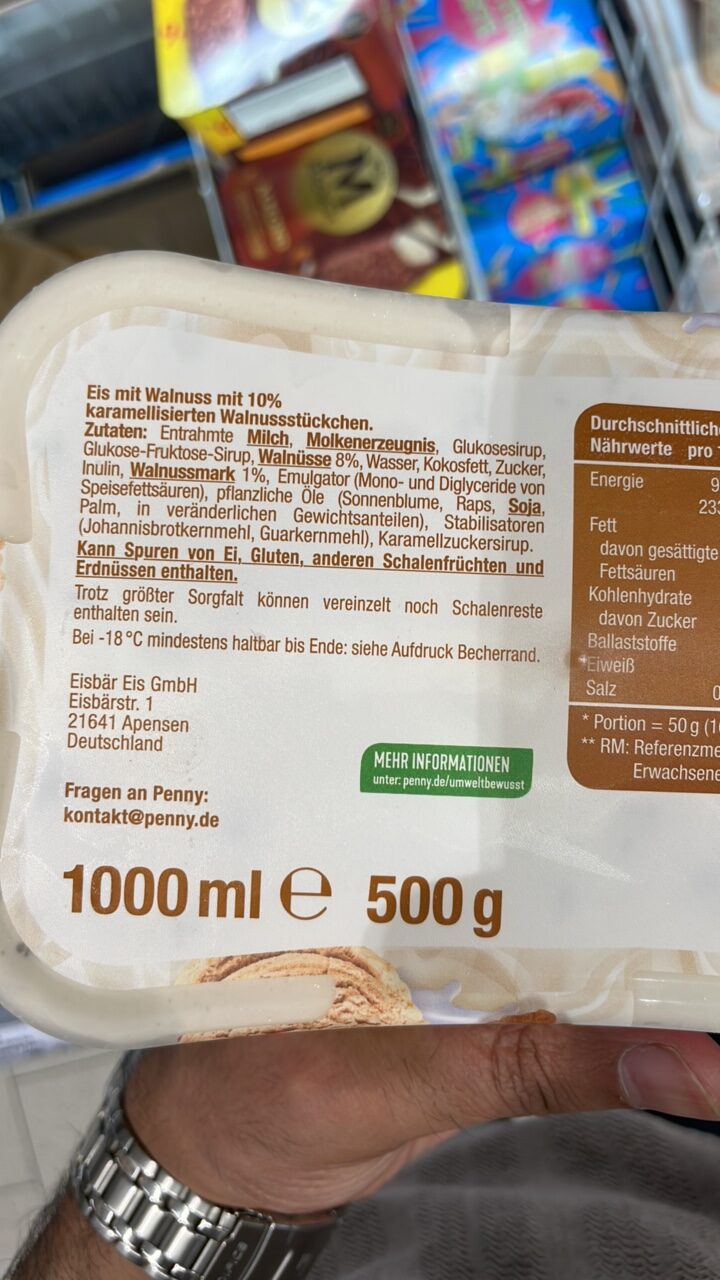
Barcode: 26029870
eis mit walnuss mit 10%
HALAL
📝 Reason: Based on the ingredients listed, most components are naturally Halal or are plant-derived. However, ’emulgator’ (emulsifier) and ‘stabilisatoren’ (stabilizers) are doubtful, as they may originate from animal sources or blended glycerides, which can be Haram if from non-Halal animals. Lacking certification or clear source, these are marked as Doubtful. In Islam, uncertain (mashbooh) ingredients require caution (Quran 5:3). Major halal food authorities recommend only consuming when source is verified. See IFANCA and www.halalhmc.org for ingredient evaluations.
🏷️ Category: Ice Cream
📄 Certificates: 500 G, 1000 Ml, Vegetarisch
Ingredients:
Details
Understanding the Halal Status of Eis mit Walnuss mit 10%
Eis mit Walnuss mit 10% is a delightful ice cream product that brings the rich flavor of walnuts to your taste buds. For those who follow Halal dietary guidelines, understanding the Halal status of ice creams, particularly this specific variant, is crucial. In this extensive overview, we will delve into its ingredients, their origins, and determine the overall Halal qualification of this tasty treat.
Is Eis mit Walnuss mit 10% Halal?
The short answer is yes, Eis mit Walnuss mit 10% is classified as Halal based on its ingredient composition. Most of the components used in this product are either plant-based or derived from animals that are considered Halal. However, there are a few ingredients worth discussing that may raise questions regarding their Halal suitability.
Ingredient Breakdown
- Entrahmte milk: This refers to skimmed milk, which is generally Halal as long as no Haram additives are included (source).
- Molkenerzeugnis (whey product): Whey is usually Halal unless it contains alcohol or enzymes derived from Haram animals. This product contains no evidence of Haram sources (source).
- Glukosesirup: This syrup is produced from starch (corn, wheat, etc.) and is Halal unless processed with Haram agents, which is rare (source).
- Glukose-fruktose-sirup: This syrup is derived from plant sources and is confirmed Halal (source).
- Walnüsse: Naturally Halal as they are whole nuts (source).
- Wasser: Water is universally Halal unless contaminated (source).
- Kokosfett: This coconut fat is plant-based and Halal (source).
- Zucker: Sugar is generally Halal as it is plant-derived (source).
- Inulin: A plant-derived fiber, usually sourced from chicory, and is Halal (source).
- Walnussmark: Walnut paste made from Halal walnuts (source).
- Emulgator: The emulsifier used in this product raises some concerns as it can be derived from animals or plants. Without certification, its source is unclear and is thus labeled as Doubtful (source, source).
- Pflanzliche Öle: The vegetable oils present, including sunflower, canola, soy, and palm, are all Halal (source).
- Stabilisatoren: These stabilizers have a vague origin and could be of plant or animal nature, which places them in a doubtful category (source, source).
- Johannisbrotkernmehl: Known as carob bean gum (E410), it is Halal as it is plant-derived (source).
- Guarkernmehl: Guar gum (E412) is also Halal as it is derived from guar beans (source).
- Karamellzuckersirup: This syrup is generally Halal unless alcohol is used (not indicated here) (source).
Concluding Thoughts on Halal Certification
It is imperative for consumers who adhere to Halal dietary laws to pay attention to product ingredients. For Eis mit Walnuss mit 10%, while the majority of its components are Halal, the emulsifier and stabilizers require additional scrutiny due to their ambiguous source.
For ultimate peace of mind, it is advisable to seek Halal certification or ensure clarity from the manufacturer about these dubious ingredients. Resources such as Halal HMC and IFANCA can provide further insights regarding ingredient evaluations. Being informed empowers you to make confident choices in alignment with your dietary constraints.
